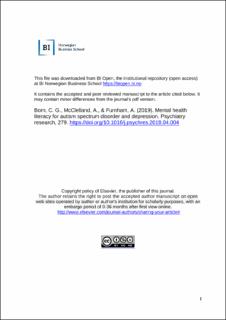| dc.contributor.author | Godfrey Born, Charlotte | |
| dc.contributor.author | McClelland, Alastair | |
| dc.contributor.author | Furnham, Adrian | |
| dc.date.accessioned | 2021-01-21T09:47:57Z | |
| dc.date.available | 2021-01-21T09:47:57Z | |
| dc.date.created | 2019-08-26T12:18:23Z | |
| dc.date.issued | 2019 | |
| dc.identifier.citation | Psychiatry Research. 2019, 279 272-277. | |
| dc.identifier.issn | 0165-1781 | |
| dc.identifier.uri | https://hdl.handle.net/11250/2724064 | |
| dc.description.abstract | In this study, three hundred and sixty-eight participants answered a questionnaire consisting of three vignettes describing a person with depression, severe Autism Spectrum Disorder (ASD), and high-functioning Autism Spectrum Disorder/Asperger's Syndrome (AS). Each vignette was followed by thirteen questions concerning the participant's knowledge about diagnosis, treatment, and prognosis. Participants demonstrated good mental health literacy (MHL) for depression, but were poor at diagnosing ASD. Drug therapy was rated as the least effective treatment and ‘talking to a family member of friend’ was rated as the most effective for each disorder. The highest prognosis ratings were given to depression, and the lowest given to ASD. Participants demonstrated better MHL than expected, possibly due to the availability of information on the Internet and the increase in prevalence of mental illnesses such as depression and ASD among the general population. | |
| dc.language.iso | eng | |
| dc.title | Mental health literacy for autism spectrum disorder and depression | |
| dc.type | Peer reviewed | |
| dc.type | Journal article | |
| dc.description.version | acceptedVersion | |
| dc.source.pagenumber | 272-277 | |
| dc.source.volume | 279 | |
| dc.source.journal | Psychiatry Research | |
| dc.identifier.doi | 10.1016/j.psychres.2019.04.004 | |
| dc.identifier.cristin | 1718687 | |
| cristin.unitcode | 158,4,0,0 | |
| cristin.unitname | Institutt for ledelse og organisasjon | |
| cristin.ispublished | true | |
| cristin.fulltext | postprint | |
| cristin.qualitycode | 1 | |
